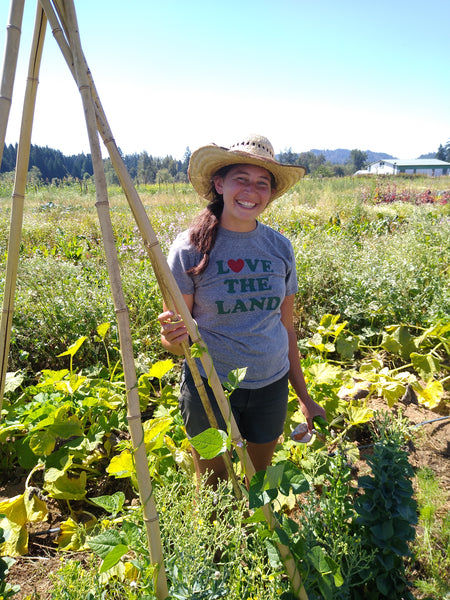
Michelle Week in our Love The Land Tee
____
Tell us about your farm!
I operate a one-acre mixed produce CSA farm with an emphasis on Pacific Northwest First Foods. The Farm’s name is x̌ast sq̓it (hast squeit) which translates to Good Rain in the traditional language of the sngaytskstx (Sinixt) the Arrow Lakes Peoples. I also raise heritage breed Champagne d’Argent meat rabbits to provide full dietary and meal options to our members. The rabbits also help ‘close the loop’ by creating soil amendments and improving farm ecology. My heritage is of Sinixt ancestry by way of the Coville Confederated Tribes as well as French and a tiny bit of Norwegian. Raising the French heritage breed rabbits and growing items like January King cabbage alongside Stinging Nettles and Oregon Grape give me an opportunity to explore and play with my Chinook Jargon Ancestry! The principles of Good Rain Farm are decolonizing diets, revitalizing culture, food sovereignty and the returning to reverent sustainable land stewardship.
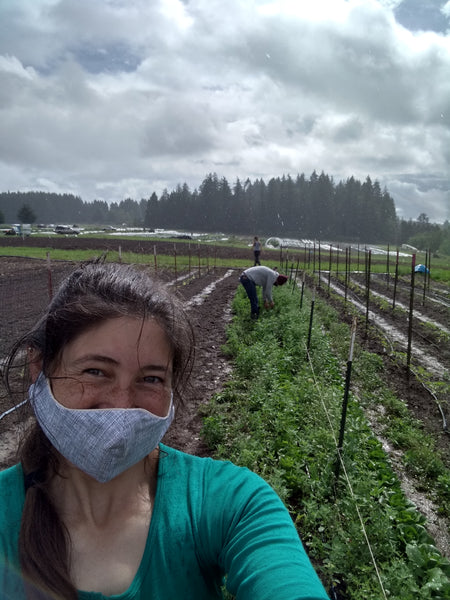
Growing up I always loved tending to plants and animals. We had so many animals in our home from dogs and cats to ducks and sheep, and my lovable llamas! I was president of the 4-H club and one year was gifted with three large raised garden beds in our front lawn! My folks didn't know yet about Food Not Lawns and my forthcoming radical tendencies. Years later I realized that this deep passion and interest of mine could be more than a hobby. After the 2016 elections, I started a large garden with a friend wanting to donate food and make a meaningful impact. We ended up selling some food to a local restaurant and from there I dove into the deep end! Farming started as a way for me to have more transparency in the food I eat and has turned into this journey of re-connection. It has become a life-changing ability to speak with my ancestors, rediscover and explore my culture and really develop relationships with my Native community as well as all kin, plant, animal, weather, and rocks, etc.
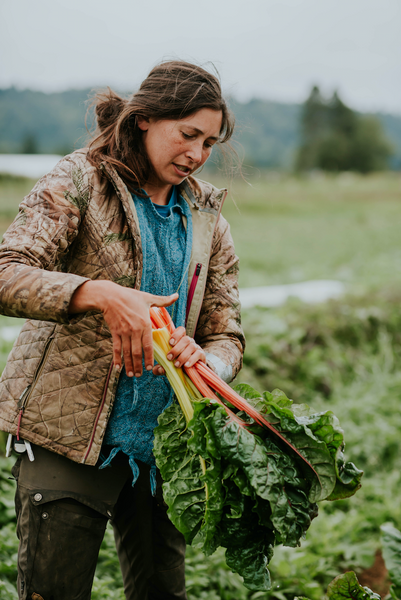
As an Indigenous Female Farmer, I face a daily sampling of micro-aggressions, skepticism, and misogyny. My perspective and suggestions for solutions are frequently ignored and brushed off or, worse yet, stolen, and soon after excitedly regurgitated to me. I have to prove my knowledge and expertise regularly to establish my authority with those still caught up in colonial, patriarchal, and white supremacist thinking. My mere presence as an indigenous farmer in the Ag community is a radical act and this need to prove to a community that I do in fact Belong Here can be tedious and tiresome. Land access and access to capital are huge hurdles for small farms. Tenant farming is filled with risk and ongoing negotiations and a lack of permanent infrastructure solutions, the very solutions that would protect the farm’s bottom line and allow for full growing capacity. In order to attain financial sustainability, the farm has to reach a certain size and volume, and the limitations of rented land and reduced opportunities for traditional capital loans makes that challenging. In steps the community with donations, grant funding, and a network of compassionate helpers. It is in this community that I find hope. So much of farming doesn’t look like farming to me, I call it Incognito Farming. There is so much information to manage on a farm, so many moving parts to working the land sure, but also the social media presence, the speaking engagements, the community outreach, the curriculum development for my interns… I didn’t expect to be sitting in front of a computer screen this much. Getting my foot in the door, finding customers, building relationships with restaurants, and establishing an audience that is willing to purchase from me has taken a level of transparency, vulnerability, and authenticity that I find challenging at times. These traits give me confidence in my voice and vision for my farm, and I work hard to nurture and foster them with self-reflection. Concluding that this work was never meant to be done alone, I am pushing the farm forward towards a cooperative management path in the hopes of pooling the energy, resources, and also the liability of this work so that we can achieve the greater goals of Food Sovereignty and Decolonizing Diets.
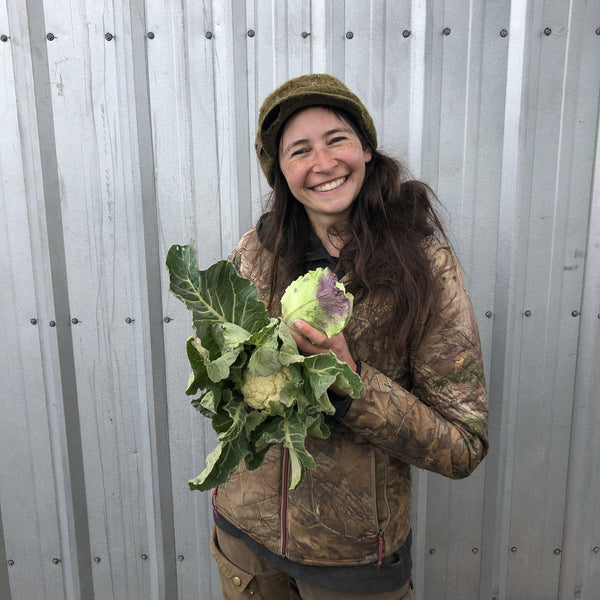
Climate change has been a topic of discussion my whole life from studying about rain-forest deforestation in grade school, to majoring in Cultural Ecology in college. Then I started researching how to better connect people to the land regardless of where their ancestors may be from. I wanted to reach out to those who don’t fully understand the history of the place they were currently calling home. I wanted to tap into people’s visceral experience of their hometown being changed and paved over with strip malls and apply that experience to further away places that we engage in a more abstract way via global markets, which we are intricately tied up in. We cause impact to these far-away places with our trade policies, local trash collections, and resource industries such as fisheries here in the PNW. I saw a broad connection between global trade policies, local recycling, and waste reduction efforts, how we manage our natural resources in the PACNW. The holistic view brought me back to food. The racial inequities that exist within the intersection of environmentalism and the local food movement became clear. What I chose to eat every day felt like one of the largest environmental impacts available to me that I had the most control over. I followed my grocery co-op’s buying guidelines and purchased local, organic produce. I got familiar with the farmer’s markets. I explored food preservation methods such as drying, pickling, and fermenting. In my desire to honor my own body through food evolved into a desire to honor other people’s bodies through food, and I was inching ever closer to the ingredients until I was tending them in the field, from seed. I became a farmer to know the whole truth, to create transparency in our food system, to lay bare the difficult compromises that even local, organic, sustainable farms reckon with. Farming was a tangible way for me to make a positive impact in my community, an opportunity to build a reverent relationship with the land and plants I grow, to expand our concept of community to include non-human beings.
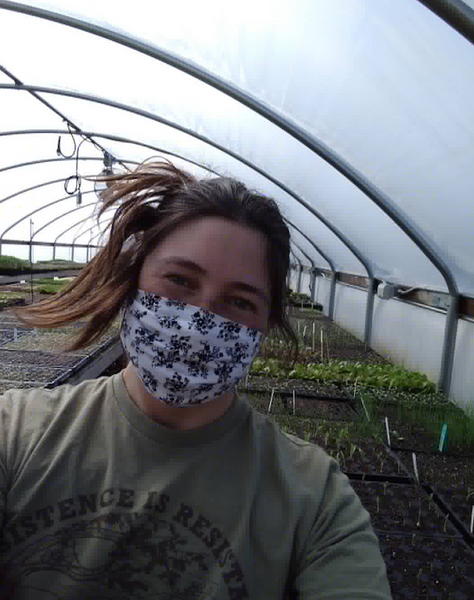
I see 2 major omissions in the mainstream conversations about farming, agriculture, and climate change: The first is that Farms and the Agriculture Industry alone won’t shift how successful we are at navigating Climate Change unless we address social inequities that make good, local, and organic food inaccessible to the majority of our community members. There are huge omissions from the conversation on Agriculture and Climate Change. We rarely dive deep into the racial injustices that are pervasive throughout agriculture and we talk very little about farm labor in mainstream media. Then we come to resource management, property zoning laws, development, land access, and land use issues. This omission in mainstream conversation is by far the worst in my opinion. We are paving over viable, healthy, prime agriculture real estate for strip mall and suburban sprawl. This topic weaves its way into Food sovereignty discussions as local and national politics dictate where we can or can’t grow food, and how sprawl distances consumers from the farmer and handing undo transit cost and access burdens onto the farmer. Farmland nearest the consumer is costly, further away the land is cheaper but the fuel costs, financially and pollution, it adds up. We must all make significant behavioral and lifestyle changes, make difficult choices about where and how we can utilize our privileges to better support and shift the social, political, and economical structures in which we currently find ourselves within. We need to address how we access farming and who accesses farming, farmland, and locally farmed food.
Farming for me has always been about self-sufficiency, community, and autonomy. I’ve always enjoyed the freedom growing my own food brought me. It’s a skill and opportunity to opt-out of the governing bodies and capitalistic economy we find ourselves in, an opportunity to imagine a future without the burden of knowing where or who is going to meet our basic needs. I also recognize that not everyone can be a farmer, working long hours, engaging in physically strenuous activities, nor can a farmer do the work they do without inventors, creators, data management, and loads of support. When I focused on Food Sovereignty I found the community that could help support me as a farmer. A community who wanted to self-govern, engage in relationship building, who sought transparency, and who also had skills eager to apply to a new social order. Building community, redefining our food, government, economic systems together has become what I farm for. I farm because a community believes in my right to know my ancestral food ways, my native culture, my language, and I farm so they can explore theirs too. Farming, growing food, brings us closer to our histories, closer to our cultures, closer to the rhythms of the Earth and the larger inter-species community we cohabitate with. The future I farm for is equitable, full of diversity, celebrates different cultures, and supports one another. I already see this future taking shape and I couldn’t be more awestruck. Farming is home, it’s place making, it’s not the end of our journey but farming in community, sustainably in servant leadership, has certainly been a step in the right direction.
I operate a one-acre mixed produce CSA farm with an emphasis on Pacific Northwest First Foods. The Farm’s name is x̌ast sq̓it (hast squeit) which translates to Good Rain in the traditional language of the sngaytskstx (Sinixt) the Arrow Lakes Peoples. I also raise heritage breed Champagne d’Argent meat rabbits to provide full dietary and meal options to our members. The rabbits also help ‘close the loop’ by creating soil amendments and improving farm ecology. My heritage is of Sinixt ancestry by way of the Coville Confederated Tribes as well as French and a tiny bit of Norwegian. Raising the French heritage breed rabbits and growing items like January King cabbage alongside Stinging Nettles and Oregon Grape give me an opportunity to explore and play with my Chinook Jargon Ancestry! The principles of Good Rain Farm are decolonizing diets, revitalizing culture, food sovereignty and the returning to reverent sustainable land stewardship.
____

____
How did you get into farming?
Growing up I always loved tending to plants and animals. We had so many animals in our home from dogs and cats to ducks and sheep, and my lovable llamas! I was president of the 4-H club and one year was gifted with three large raised garden beds in our front lawn! My folks didn't know yet about Food Not Lawns and my forthcoming radical tendencies. Years later I realized that this deep passion and interest of mine could be more than a hobby. After the 2016 elections, I started a large garden with a friend wanting to donate food and make a meaningful impact. We ended up selling some food to a local restaurant and from there I dove into the deep end! Farming started as a way for me to have more transparency in the food I eat and has turned into this journey of re-connection. It has become a life-changing ability to speak with my ancestors, rediscover and explore my culture and really develop relationships with my Native community as well as all kin, plant, animal, weather, and rocks, etc.
____

____
What are some of the biggest challenges you face as a farmer?
As an Indigenous Female Farmer, I face a daily sampling of micro-aggressions, skepticism, and misogyny. My perspective and suggestions for solutions are frequently ignored and brushed off or, worse yet, stolen, and soon after excitedly regurgitated to me. I have to prove my knowledge and expertise regularly to establish my authority with those still caught up in colonial, patriarchal, and white supremacist thinking. My mere presence as an indigenous farmer in the Ag community is a radical act and this need to prove to a community that I do in fact Belong Here can be tedious and tiresome. Land access and access to capital are huge hurdles for small farms. Tenant farming is filled with risk and ongoing negotiations and a lack of permanent infrastructure solutions, the very solutions that would protect the farm’s bottom line and allow for full growing capacity. In order to attain financial sustainability, the farm has to reach a certain size and volume, and the limitations of rented land and reduced opportunities for traditional capital loans makes that challenging. In steps the community with donations, grant funding, and a network of compassionate helpers. It is in this community that I find hope. So much of farming doesn’t look like farming to me, I call it Incognito Farming. There is so much information to manage on a farm, so many moving parts to working the land sure, but also the social media presence, the speaking engagements, the community outreach, the curriculum development for my interns… I didn’t expect to be sitting in front of a computer screen this much. Getting my foot in the door, finding customers, building relationships with restaurants, and establishing an audience that is willing to purchase from me has taken a level of transparency, vulnerability, and authenticity that I find challenging at times. These traits give me confidence in my voice and vision for my farm, and I work hard to nurture and foster them with self-reflection. Concluding that this work was never meant to be done alone, I am pushing the farm forward towards a cooperative management path in the hopes of pooling the energy, resources, and also the liability of this work so that we can achieve the greater goals of Food Sovereignty and Decolonizing Diets.
____

____
What are your thoughts and beliefs on farming in the face of climate change?
Climate change has been a topic of discussion my whole life from studying about rain-forest deforestation in grade school, to majoring in Cultural Ecology in college. Then I started researching how to better connect people to the land regardless of where their ancestors may be from. I wanted to reach out to those who don’t fully understand the history of the place they were currently calling home. I wanted to tap into people’s visceral experience of their hometown being changed and paved over with strip malls and apply that experience to further away places that we engage in a more abstract way via global markets, which we are intricately tied up in. We cause impact to these far-away places with our trade policies, local trash collections, and resource industries such as fisheries here in the PNW. I saw a broad connection between global trade policies, local recycling, and waste reduction efforts, how we manage our natural resources in the PACNW. The holistic view brought me back to food. The racial inequities that exist within the intersection of environmentalism and the local food movement became clear. What I chose to eat every day felt like one of the largest environmental impacts available to me that I had the most control over. I followed my grocery co-op’s buying guidelines and purchased local, organic produce. I got familiar with the farmer’s markets. I explored food preservation methods such as drying, pickling, and fermenting. In my desire to honor my own body through food evolved into a desire to honor other people’s bodies through food, and I was inching ever closer to the ingredients until I was tending them in the field, from seed. I became a farmer to know the whole truth, to create transparency in our food system, to lay bare the difficult compromises that even local, organic, sustainable farms reckon with. Farming was a tangible way for me to make a positive impact in my community, an opportunity to build a reverent relationship with the land and plants I grow, to expand our concept of community to include non-human beings.
____

____
What are some misconceptions you hear about farming and agriculture when it comes to climate change that you'd like to address?
I see 2 major omissions in the mainstream conversations about farming, agriculture, and climate change: The first is that Farms and the Agriculture Industry alone won’t shift how successful we are at navigating Climate Change unless we address social inequities that make good, local, and organic food inaccessible to the majority of our community members. There are huge omissions from the conversation on Agriculture and Climate Change. We rarely dive deep into the racial injustices that are pervasive throughout agriculture and we talk very little about farm labor in mainstream media. Then we come to resource management, property zoning laws, development, land access, and land use issues. This omission in mainstream conversation is by far the worst in my opinion. We are paving over viable, healthy, prime agriculture real estate for strip mall and suburban sprawl. This topic weaves its way into Food sovereignty discussions as local and national politics dictate where we can or can’t grow food, and how sprawl distances consumers from the farmer and handing undo transit cost and access burdens onto the farmer. Farmland nearest the consumer is costly, further away the land is cheaper but the fuel costs, financially and pollution, it adds up. We must all make significant behavioral and lifestyle changes, make difficult choices about where and how we can utilize our privileges to better support and shift the social, political, and economical structures in which we currently find ourselves within. We need to address how we access farming and who accesses farming, farmland, and locally farmed food.
____
What future are you farming for and how do you think your farm can make a difference?
Farming for me has always been about self-sufficiency, community, and autonomy. I’ve always enjoyed the freedom growing my own food brought me. It’s a skill and opportunity to opt-out of the governing bodies and capitalistic economy we find ourselves in, an opportunity to imagine a future without the burden of knowing where or who is going to meet our basic needs. I also recognize that not everyone can be a farmer, working long hours, engaging in physically strenuous activities, nor can a farmer do the work they do without inventors, creators, data management, and loads of support. When I focused on Food Sovereignty I found the community that could help support me as a farmer. A community who wanted to self-govern, engage in relationship building, who sought transparency, and who also had skills eager to apply to a new social order. Building community, redefining our food, government, economic systems together has become what I farm for. I farm because a community believes in my right to know my ancestral food ways, my native culture, my language, and I farm so they can explore theirs too. Farming, growing food, brings us closer to our histories, closer to our cultures, closer to the rhythms of the Earth and the larger inter-species community we cohabitate with. The future I farm for is equitable, full of diversity, celebrates different cultures, and supports one another. I already see this future taking shape and I couldn’t be more awestruck. Farming is home, it’s place making, it’s not the end of our journey but farming in community, sustainably in servant leadership, has certainly been a step in the right direction.
_____
How can we follow along and support you?
Website: www.goodrainfarm.com
Instagram: @goodrainfarm

